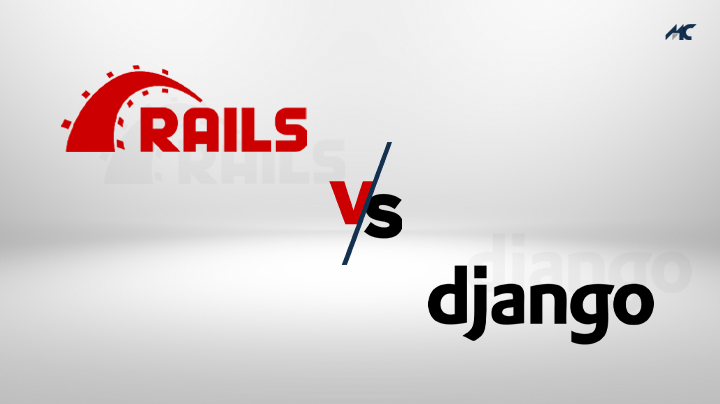Ruby On Rails vs Django, Which Contender Dominates The Battle?
All set for the next web app development project? Django and Ruby On Rails are the two most popular frameworks for developing web apps. So, here is a reality check to find out an ultimate winner between the two, Ruby On Rails vs Django.
Among more than 90 web development frameworks out there, both Ruby On Rails and Django stand out for some obvious reasons. No doubt it won’t be easy to choose the one that goes well with your project’s requirements. Nowadays, the majority of developers either go for Django or Ruby On Rails to build high-performing web apps from scratch. Keeping the major aspects of a project in mind, techies consider the project type, size, & preferences of the development team to choose a suitable framework for web app development project. Even though there are multifarious technology stacks to pick, Django & Ruby On Rails are the most preferred frameworks for creating web apps.
What makes both the frameworks sworn competitors? When it comes to Ruby on Rails vs Django, both are ahead in the race of agile development of web application. The exceptional likability of two frameworks is influenced by some peculiar similarities as both frameworks are object-oriented and typed dynamically alongside comprising multiple ready-to-use libraries.
On one side, some top trending platforms such as Instagram, Dropbox, YouTube, Spotify, etc. are powered by Django.
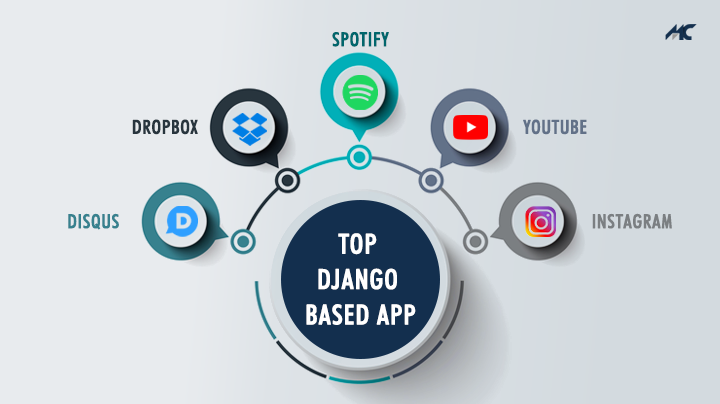

Ruby On Rails has been used by some leading brands named as Airbnb, Shopify, Bloomberg, & more.
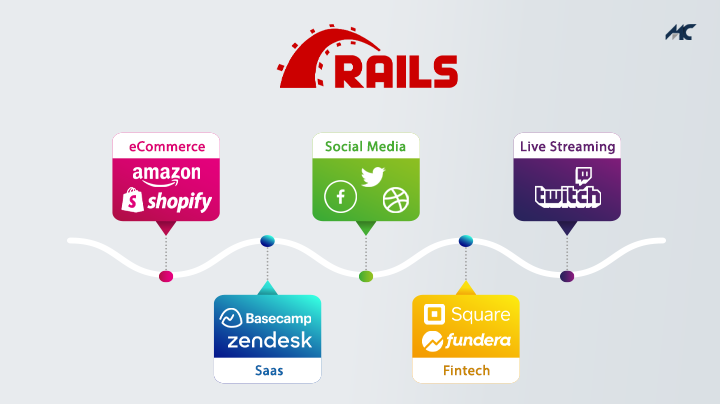

Therefore, the competition is tough & there is a long way to go with comparative analysis of both the frameworks.
Some basic details for Ruby On Rails vs Django
-
Ruby On Rails
Rolled out in 2004, Ruby On Rails is now one of the most popular web frameworks used by the worldwide developers for building web applications. The framework is built on Ruby programming language & meant for speedy web app development process. Apart from being open-source, object-oriented, & general-purpose web programming language, Ruby On Rails is popular for bringing powerful testing frameworks with excellent flexibility & ease to write elegant and error-free codes.
-
Django web framework
It was officially released as a feature-packed Python framework in 2005. Django makes use of existing codes to make you more productive. The credit goes to its DRY principle i.e Don’t Repeat Yourself to speed the web app development process. The amazing versatility of Django makes it exceptionally popular not only in the publishing industry but also in data science, content management system, fin-tech, e-commerce, booking engines, & more. Today, Django holds a massive community of programmers as its combination with Python is easier to learn and faster to write.
Similarities b/w Ruby On Rails and Django
Before zooming into the pros & cons of two popular frameworks, we’re excited to highlight some key similarities between them. Most programmers share their experience with Ruby On Rails as well as Django and compare their potentials in terms of speed, usability, complexities or hurdles that may arise in the midst of web app development process. Although it is a sole decision of yours either to choose Ruby On Rails or Django, we’re categorizing their similarities to let you decide which one is right for you. Here are some key pointers that make them similar:
-
Ruby for Rails & Python for Django
Both Python & Ruby are object-oriented languages that are completely different from languages used in enterprise ecosystems like Java. They both are powerful & open source with a wide user base. It simply means that developers don’t need to worry about documentation while using any of the two frameworks.
-
Good for CPU expensive operations
In the midst of building a standard CRUD app, Ruby & Python combine with both the respective frameworks with a similar range of performance. Although some minor differences might occur in their performance, neither of them will suit your needs if your project focuses on serving thousands of existing users at a time.
-
Based on the MVC model
The architecture of respective programming languages used by both frameworks is inspired by an MVC model. Even though elements are being arranged differently in Rails & Django, there is nothing to worry as it is just a layout. MVC based architecture will structure your app sophisticatedly with a set of defined controllers, routes, models & views integrated within the framework.
Let’s differentiate for Django vs Ruby On Rails
- Django uses Python while ROR is based on Ruby. Ruby is preferred for its versatility along with understandable syntax whereas Python facilitates clarity with better code readability. On one side, Ruby imparts joyful experience while writing codes, Python intends to provide an easy to learn & write codes in the most simplified manner.
- Django is based on MVT model (Model-View-Template) while ROR is based on MVC (Model-View-Controller). MVT in Django reflects a database with specific data structure & regular expression-based URL dispatcher to control the views whereas MVC in ROR comprises database to showcase pictures, posts, comments, etc. under the control of ActiveRecord.
- Rails run faster by 0.7% as compared to Django. Although Django continues to contribute in the speedy development process, ROR takes a lead with a rich repository of multiple libraries & plugins adding on to double up the speed & performance.
- Security is one major factor to compare b/w Django & ROR. The power of Python makes Django more secure to be used for web app development. Even NASA opted for Django framework over ROR as it comes with middlewares while Rails goes on with active records. However, both ROR & Django come up with tools that secure your web apps from SQL injection, XSS i.e cross-site scripting, etc.
- Django’s latest version was introduced in 2019 and ROR’s update was released on August 2018.
- ROR dominates Django in terms of scalability even though it has gained this characteristic from Python. Rails offer freedom & real joy while writing codes with added flexibility and hence, it grabs the winning crown.
- Rails once again take a lead in developing database-driven web apps in lesser time with more choice for metaprogramming & writing elegant codes. Django is also useful for adding efficient scientific programming, data analytics, system administration, & more.
Conclusion
Both Django & Ruby On Rails are topping the popularity charts among top web frameworks. However, tech giants are still debating on Django vs Ruby On Rails as there is a cut-throat competition between two trending frameworks. After throwing lights on the potentials of both, we can conclude with a fact that Django could be an ideal option if you need a fully detailed app with unique features whereas it is suggested to go with Ruby On Rails if you’re planning for a quick launch.
-

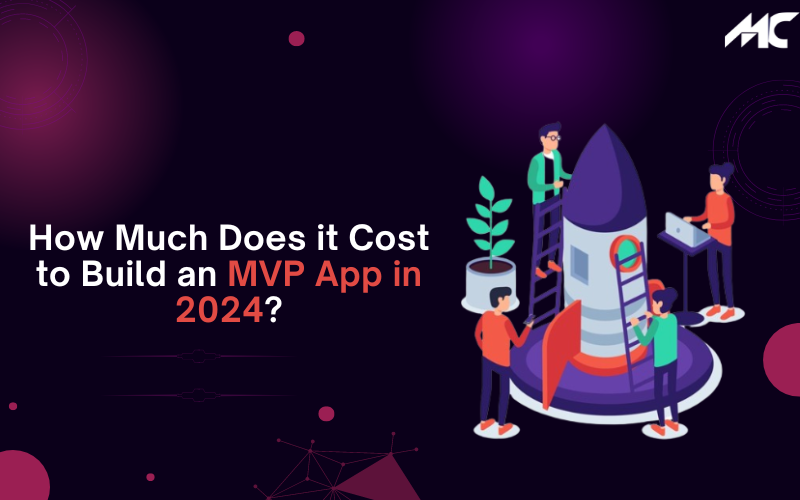 How Much Does it Cost to Build an MVP App in 2024?
How Much Does it Cost to Build an MVP App in 2024? -

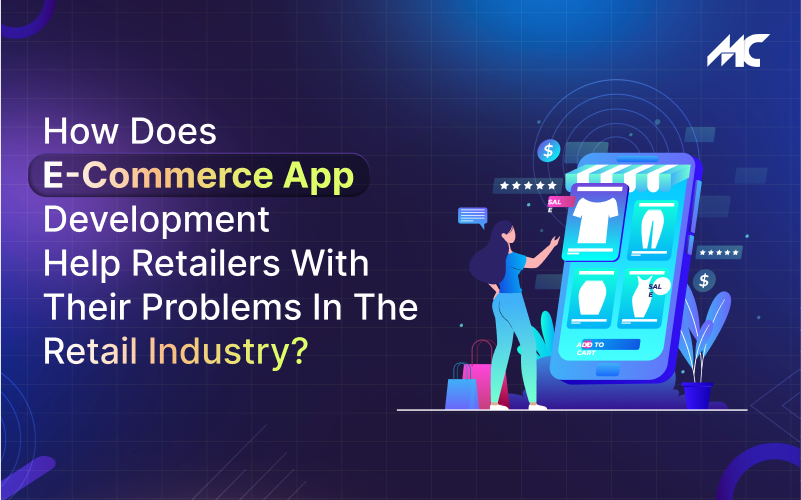 How Does E-Commerce App Development Help Retailers With Their Problems in the Retail Industry?
How Does E-Commerce App Development Help Retailers With Their Problems in the Retail Industry? -

 How AI is Changing the Landscape of the Online Food Delivery Industry?
How AI is Changing the Landscape of the Online Food Delivery Industry?



